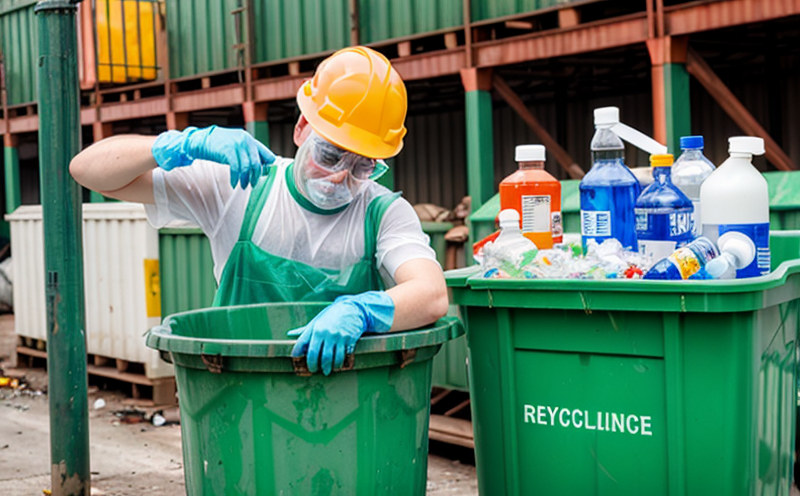ISO 16266 Pseudomonas Aeruginosa Testing in Recycled Water
The testing of recycled water for Pseudomonas aeruginosa, a ubiquitous opportunistic pathogen, is crucial to ensure the safety and quality of reused water. This test aligns with international standards such as ISO 16266, which provides guidelines for microbiological quality assessment in reclaimed water systems.
The presence of Pseudomonas aeruginosa can indicate contamination that may compromise public health or industrial processes reliant on recycled water. In the context of chemical testing and waste management, this test is particularly important because it ensures that recycled water meets stringent microbial standards before reuse in various applications.
The testing process involves several critical steps: first, a representative sample of the recycled water must be collected according to ISO 16266 guidelines. This sample should reflect the entire range of potential contamination levels present within the system. Once collected, the sample undergoes rigorous preparation and incubation in selective media designed to isolate Pseudomonas aeruginosa. This step is crucial as it ensures that only true-positive results are counted.
The isolation process typically takes several days due to the slow growth rate of this organism. Once isolated, the sample undergoes further confirmation tests to ensure accuracy and reliability. These confirmatory methods can include biochemical testing or molecular techniques such as PCR (Polymerase Chain Reaction) for species-specific detection.
The results from these tests are then compiled into a comprehensive report that includes details on the concentration levels of Pseudomonas aeruginosa found in the sample. This report is essential for stakeholders involved in water treatment, waste management, and public health to make informed decisions about the safety of recycled water.
The significance of this test extends beyond mere compliance with standards; it also plays a vital role in safeguarding public health and environmental integrity. By ensuring that recycled water systems are free from harmful pathogens like Pseudomonas aeruginosa, we contribute to sustainable resource management practices.
In summary, ISO 16266 Pseudomonas Aeruginosa Testing in Recycled Water is a critical component of any comprehensive waste and recycling program. It ensures that recycled water meets the highest microbial quality standards, thereby protecting both human health and environmental ecosystems.
Applied Standards
The testing for Pseudomonas aeruginosa in recycled water is governed primarily by ISO 16266: Microbiological Quality of Recycled Water, which provides the framework for assessing microbial quality. This standard specifies methods and criteria to ensure that reclaimed water is safe for its intended uses.
In addition to ISO standards, local regulations and guidelines may also apply depending on jurisdiction. For instance, in many countries, there are specific rules regarding the reuse of industrial wastewater or potable water in agriculture. These local norms often align closely with international best practices but can include additional requirements tailored to regional conditions.
- ISO 16266: Microbiological Quality of Recycled Water - This provides a comprehensive guide on how to assess the microbial quality of recycled water, including sampling techniques, analytical methods, and criteria for acceptable levels of Pseudomonas aeruginosa.
- Local Regulations: Depending on your location, there may be specific laws or directives that must be adhered to. For example, the European Union's Water Framework Directive (WFD) has stringent requirements for water reuse.
- AWS 108: This American Water Works Association guideline focuses specifically on reclaimed water used in irrigation and other non-potable applications, but it also provides valuable insights into maintaining microbial safety.
Compliance with these standards ensures that the testing process is consistent and reliable across different regions and facilities. It helps to build confidence among end-users of recycled water regarding its quality and safety.
Eurolab Advantages
At Eurolab, we offer unparalleled expertise in conducting ISO 16266 Pseudomonas Aeruginosa Testing in Recycled Water. Our dedicated team of microbiologists and chemists ensure that every step of the testing process adheres strictly to international standards.
We employ state-of-the-art laboratories equipped with advanced instrumentation, including automated incubators and PCR machines, which allow us to deliver accurate results quickly. This capability is crucial given the time-sensitive nature of water quality assessments.
Our commitment extends beyond technical proficiency; we also provide detailed reports that go beyond mere compliance checklists. These reports offer actionable insights into potential areas for improvement in your waste management and recycling processes. Our clients benefit from this level of transparency, which fosters continuous improvement within their operations.
In addition to our robust testing capabilities, Eurolab offers comprehensive support throughout the entire water quality assessment process, from initial consultation through final report delivery. This holistic approach ensures that our customers receive full value from each service engagement.
Our network of global laboratories allows us to serve clients worldwide efficiently and effectively. With local offices in key regions, we can respond promptly to urgent testing needs or provide ongoing support for large-scale projects involving multiple sites.
Frequently Asked Questions
Use Cases and Application Examples
- Municipal Water Systems: Ensuring that reclaimed municipal wastewater is safe before being used in irrigation or industrial processes.
- Industrial Facilities: Testing recycled water from manufacturing plants to ensure it meets environmental discharge standards.
- Agricultural Irrigation: Verifying the safety of reused greywater for crop cultivation without compromising yield or product quality.
- Pharmaceutical Industries: Guaranteeing that purified wastewater is free from contaminants before being discharged into natural water bodies.
- Retail Chains: Monitoring recycled water used in cleaning and sanitation processes to maintain high hygiene standards.
- Environmental Agencies: Assessing compliance with local regulations regarding the reuse of treated wastewater for various applications.
In all these scenarios, ISO 16266 Pseudomonas Aeruginosa Testing plays a pivotal role in maintaining both environmental and public health standards.





